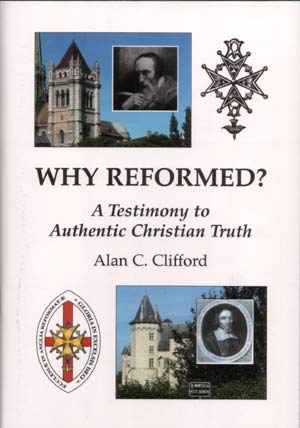WHY REFORMED?
To purchase using PayPal/credit/debit card (a new window will open
WHY REFORMED?
A Testimony to Authentic Christian Truth
Alan C. Clifford
60pp pbk £3.00 (plus p&p)
ISBN 978 0 9555165 5 9
CONTENTS
- THE NRC MANIFESTO
- 1. NOT ROMAN CATHOLIC
- 2. NOT ANGLICAN
- 3. NOT ORTHODOX
- 4. NOT ‘WESTMINSTER’ PRESBYTERIAN
- 5. NOT CONGREGATIONAL
- 6. NOT BAPTIST
- 7. NOT METHODIST
- 8. CONCLUSION
- Appendix: NOT CHARISMATIC
FOREWORD
Norwich Reformed Church has been bearing witness to the Faith and Order of our Lord Jesus Christ for fifteen years. Besides our regular Lord’s Day services, Bible studies and prayer meetings, our weekly city-centre bookstall witness has enabled us to reach out to people of ‘all faiths and none’ in a spirit of Christian faithfulness, compassion and service to the community.
Over the years, questions have often been asked about our denominational identity. Providing brief but meaningful answers, an early attempt to state ‘where we are coming from’ was the NRC manifesto, now reproduced in this booklet. This is followed by a series of more detailed chapters, given originally as weekly historical studies. Placing our convictions in the wider context of Christian history, this publication is offered in the interests of clarifying our case for an authentic Christian perspective. We believe this is an essential task at a time of increasing confusion and uncertainty.
In the following comparisons, the distinctives of the main Christian denominations (with the exception of Lutheranism) are engaged with. Readers will note that, besides pointing out differences, areas of agreement are also indicated. It is hoped that this publication might initiate some denominational self-criticism, with a view to promoting honest Bible-based ecumenical discussion. Enquiries are welcome regarding any of the theological and historical issues covered in this booklet.
Dr Alan C. Clifford (pastor)
On the occasion of
Norwich Reformed Church’s 15th Anniversary
(23 October 2009)
REVIEW
Dr Alan Clifford is a churchman of dialogue, albeit one gloriously immune to considerations of expediency. His latest publication is an attempt to ‘initiate some denominational self-criticism, with a view to promoting honest Bible-based ecumenical discussion’. To that end, Dr Clifford offers a frank assessment of Roman Catholic belief, followed by a series of in-depth micro-studies of the main Protestant denominations. Each chapter – originally presented as an historical study at Norwich Reformed Church – follows the same structure, with sections detailing areas of agreement and disagreement preceded by an introduction and historical overview. The touchstone of truth, inevitably, is Scripture: Dr Clifford stands four-square behind those who ‘accept the Holy Bible as the inspired, inerrant, authoritative and all-sufficient Word of God’.
All kinds of things worth saying are said in these pages. Many Christians, however, as Dr Clifford freely acknowledges, will find Why Reformed? a disquieting read. Baptists, for example, are invited to ask themselves ‘what has union with Christ in His death and burial (see Rom. 6:3-6) got to do with immersion in water?’ The apostate condition of Anglicanism, where charismatic populism rubs along with syncretism and atheism, is traced back – convincingly, I feel, given my own researches – to ‘unresolved issues dating from the Reformation era’. And despite his own agreement with the principles of Presbyterianism, Dr Clifford still takes issue with ‘Confessionally-correct’ brethren who argue for the imputation of Christ’s active obedience and fail to ‘affirm the universal sufficiency of Christ’s atonement as Calvin and others taught’. His far-ranging criticism of Roman Catholicism will undoubtedly find a more general acceptance. Other chapters investigate Congregationalism, Methodism and Orthodoxy, while an appendix offers a clear-eyed assessment of the charismatic movement. A gift of compression is evident throughout.
Given its vigorous exploration of issues of vital importance to anyone who seeks unity in truth, this publication should, despite its questioning of deep-seated convictions, be welcomed by thinking Christians everywhere. Dr Clifford’s handling of a wide range of material is masterly, his scholarship is deep and his evaluations thoughtful and succinct. An active instrument for understanding the authentic Calvinism of NRC, Why Reformed? might also serve, for those who have not encountered Dr Clifford before, as a useful summary of his preoccupations to date. But there is something here for anyone seeking a fresh way of thinking about faith.
David Llewellyn Jenkins
